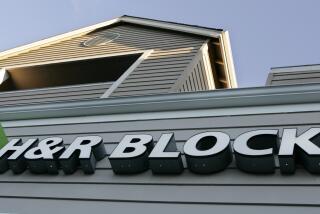Tax Services: After Block, It’s Small Potatoes : Competition: The other 2 national chains vie for second spot behind the giant. They share less than 1% of the preparation pie.
In the tax-preparation business, there’s H & R Block Inc. and there’s everyone else. No tax service company comes close in size to Block, whose empire spans 9,000 offices worldwide.
But with this year’s April 15 tax-filing deadline only a week away, the only other two national chains are battling for the No. 2 spot in the market. Triple Check Income Tax Service Inc., based in Burbank, and Jackson Hewitt Inc., based in Virginia Beach, Va., are vying to be the Avis of tax services.
In the shadow of Kansas City, Mo.-based Block, whose company-owned and franchised offices are expected to generate more than $932 million in tax-service revenue this year, Jackson Hewitt claims the second spot with 515 company-owned and franchised offices. Triple Check has 350, all franchised.
Triple Check’s claim on second place is made on its system’s $25 million in revenue. That surpasses the $23 million projected this year for Jackson Hewitt by its founder and chairman, John T. Hewitt.
Either way, it’s an accomplishment that the two chains prosper at all in the face of Block’s dominance and the highly fragmented tax-preparation business. They’ve done so not by trying to “out-Block Block,” as Triple Check President David W. Lieberman puts it, but by targeting niches of the market.
About half of the 106 million individual returns filed last year with the Internal Revenue Service were prepared by professionals. Indeed, H & R Block considers its biggest competitor to be “the individual at home doing his own return,” says the company’s chief executive, Thomas M. Bloch.
Thanks to the complicated IRS tax forms, Americans last year spent at least $4.7 billion in tax-preparation fees. Block prepared 12.4 million returns, or about 20% of the professional market. That left Triple Check (with 125,000 returns) and Jackson Hewitt (218,000) with less than 1% of the market between them.
Triple Check focuses on upper-income taxpayers--those with household incomes of $40,000 to $80,000 a year--and depends mostly on word-of-mouth advertising, Lieberman said. Jackson Hewitt goes after Block’s traditional base of middle- to low-income taxpayers but tries to draw clients with its emphasis on computerized preparation and filing services.
Besides the competition, the biggest problem for Triple Check and Jackson Hewitt is persuading taxpayers to switch preparers.
“There’s a fierce loyalty among people to their current preparers,” said Richard Tyler, Triple Check’s vice president for marketing.
Lieberman said “industrywide, there’s approximately an 80% retention rate of a client base.”
That’s a key reason why no other firms have been able to build national tax-preparation chains in the 37 years since Block was founded, Tyler said. Past rivals “came in believing there was a huge market because everybody has to file a tax return,” he said, but “people don’t like to change.”
More to Read
Inside the business of entertainment
The Wide Shot brings you news, analysis and insights on everything from streaming wars to production — and what it all means for the future.
You may occasionally receive promotional content from the Los Angeles Times.










